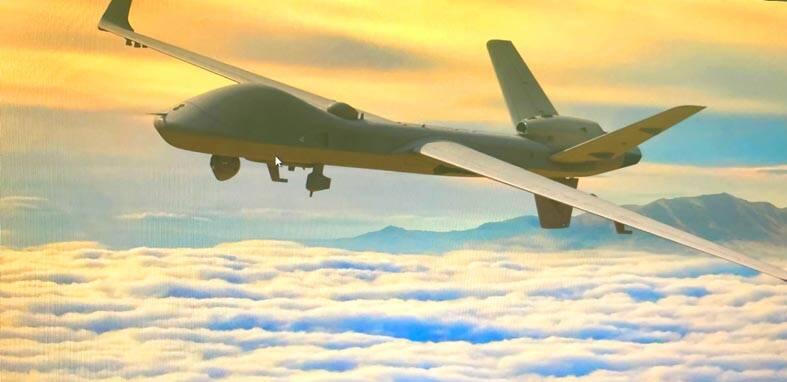The Executive Yuan today approved plans to invest NT$44.2 billion (US$1.43 billion) into domestic production of uncrewed aerial drones over the next six years, bringing Taiwan’s output value to more than NT$40 billion by 2030 and making Taiwan Asia’s democratic hub for the drone supply chain.
The budget is to include NT$10.43 billion in existing funds and NT$33.8 billion in new allocations, according to the Ministry of Economic Affairs’ (MOEA) plan.
Under the new development program, the public sector would purchase nearly 100,000 drones, of which 50,898 would be for civil and government usage and 48,750 for national defense.

Photo: Screen grab from the General Atomic Aeronautical Web site
The Ministry of National Defense would fund its procurement through the special resilience budget.
Meanwhile, the Cabinet would direct the MOEA to establish an expert panel to provide policy guidance and require quarterly progress reports.
Taiwan’s competitive advantages in the drone industry include a complete supply chain for Information and Communication Technology (ICT) drones, rapid and flexible production capacity and a proven record of producing drones independent of Chinese-manufactured components, the MOEA said.
The nation currently has about 250 drone manufacturers, whose output value reached NT$5.05 billion last year, while Taiwan has signed eight memorandums of understanding (MOU) to enter supply chains with various countries worldwide, including the US, Japan, the Czech Republic and Poland, it added.
However, key gaps in Taiwan’s supply chain include thermal cameras, laser rangefinders (LFR), GPS chips, ground control software, flight controller chips and communication modules and chips, it said.
The industry still relies on imports for core components and suffers from a small domestic market that drives up costs, insufficient testing sites and industry standards and incomplete regulations, it added.
The MOEA proposed four key policy directions for the government to boost domestic production.
First, it would expand domestic and overseas demand by using the local market as a testing ground, supporting firms through strategic investment and pursuing global opportunities via a “national team” alliance, it said.
Second, it would strengthen indigenous research and development (R&D) and international cooperation to improve supply chain autonomy, with plans underway for 50 domestic projects and 10 international joint projects, it added.
Moreover, the government would subsidize R&D for flight controller chips, communication modules and AI-powered flight control software, it said.
Third, it would create a cluster ecosystem, including an innovation and R&D center and 18 testing sites, while the National Chung-shan Institute of Science and Technology’s Minsyong Campus would host 100 drone production firms.
The institute would further establish labs in Tainan's Shalun District (沙崙) and Lioujia District (六甲) to develop 26 types of drones, the MOEA said.
Last, it would amend regulations governing drones and uncrewed vessels, revise inspection standards and establish procurement and certification systems, it said.

Japanese footwear brand Onitsuka Tiger today issued a public apology and said it has suspended an employee amid allegations that the staff member discriminated against a Vietnamese customer at its Taipei 101 store. Posting on the social media platform Threads yesterday, a user said that an employee at the store said that “those shoes are very expensive” when her friend, who is a migrant worker from Vietnam, asked for assistance. The employee then ignored her until she asked again, to which she replied: "We don't have a size 37." The post had amassed nearly 26,000 likes and 916 comments as of this

US President Donald Trump said "it’s up to" Chinese President Xi Jinping (習近平) what China does on Taiwan, but that he would be "very unhappy" with a change in the "status quo," the New York Times said in an interview published yesterday. Xi "considers it to be a part of China, and that’s up to him what he’s going to be doing," Trump told the newspaper on Wednesday. "But I’ve expressed to him that I would be very unhappy if he did that, and I don’t think he’ll do that," he added. "I hope he doesn’t do that." Trump made the comments in

Tourism in Kenting fell to a historic low for the second consecutive year last year, impacting hotels and other local businesses that rely on a steady stream of domestic tourists, the latest data showed. A total of 2.139 million tourists visited Kenting last year, down slightly from 2.14 million in 2024, the data showed. The number of tourists who visited the national park on the Hengchun Peninsula peaked in 2015 at 8.37 million people. That number has been below 2.2 million for two years, although there was a spike in October last year due to multiple long weekends. The occupancy rate for hotels

Taiwanese can file complaints with the Tourism Administration to report travel agencies if their activities caused termination of a person’s citizenship, Mainland Affairs Council Minister Chiu Chui-cheng (邱垂正) said yesterday, after a podcaster highlighted a case in which a person’s citizenship was canceled for receiving a single-use Chinese passport to enter Russia. The council is aware of incidents in which people who signed up through Chinese travel agencies for tours of Russia were told they could obtain Russian visas and fast-track border clearance, Chiu told reporters on the sidelines of an event in Taipei. However, the travel agencies actually applied